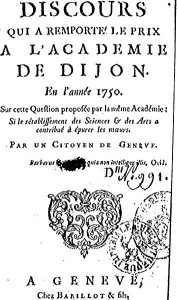Revolutionary Ideas and Works
- Major Works:

Title page of the Discourse on the Arts and Sciences
by Noël-Jacques Pissot, used under
- “Discourse on the Arts and Sciences” (1750)
- “Discourse on the Origin of Inequality” (1755)
- “The New Eloise” (1761)
- “Emile” (1762)
- “The Social Contract” (1762)
- “Letters Written from the Mount” (1764)
- “Confessions” (1770)
- Major Ideas:
- “Man is by nature good; society is the cause of corruption and vice” (Creed, 1999).
- “While society corrupts human nature, it also represents the possibility of its perfection in morality” (Creed, 1999).
In “Discourse on the Arts and Sciences,” and continuing in “Discourse on the Origin of Inequality,” Rousseau discussed the harmful influence of society on the uncorrupt human. He believed that man is essentially good while he is in his natural state, which is the state animals would be in, but modern society changes them. Each person’s experiences in society make him more and more unhappy, and good people are corrupted into something they should not become. He believed that the want to appear correct becomes more important than the truth, so honesty and morals get pushed to the side. Modern society ruins the goodness and innocence of man.
Rousseau explains the concept of ownership in his “Discourse on the Origin of Inequality.” He argues that people are by nature free, but there are natural inequalities of strength and intelligence. These are unimportant in the state of natural freedom, but they become very important to society. People begin to compare themselves with one another, and “vanity, pride, and contempt appear, and so the corruption of people by society described in the first Discourse begins” (Creed, 1999). Rousseau believes that people mislead each other when they first try to create a government, and they begin to give up their freedom for the believed protection. But instead of protection, they become slaves of their society. Also, he explains that “the state of nature ended with the first person who enclosed property and claimed ownership” (Berleant, 2007). The competition and inequality lead to a loss of freedom, which leads people away from their natural state.
Rousseau views the social order of a society in a slightly more positive light in “The Social Contract.” It is still unnatural, a result of human agreement, which makes it a social contract. Human freedom and natural equality are compromised by the social contract because it only guarantees political freedom. This is where he argues “against “the pretended right of slavery” on two grounds: the natural equality of all at birth and reasonable logic,” and he was very concerned with the limitations the state puts on individual freedoms. (Berleant 2007). “The Social Contract” is Rousseau’s attempt to provide guidelines for a society whose members are active and willing members of their community. He creates the idea of the general will, in which an “individual transfers all of his or her natural rights and freedom to everyone else in order to create a new corporate person” (Creed, 1999). All persons of the community must give up their rights equally, and then they can rediscover their individuality as part of the whole. The general will should make decisions for the good of the whole. Even Rousseau questioned whether the concept of general will would work, and he believed that the role of the government should be to obtain and uphold freedom, equality, and justice for all members of its community.
References:
Berleant, R.(2007). Rousseau, Jean Jacques. In Encyclopedia of emancipation and abolition in the transatlantic world. Retrieved from https://ezproxy.butler.edu/login?qurl=http%3A%2F%2Fsearch.credoreference.com%2Fcontent%2Fentry%2Fsharpeeman%2Frousseau_jean_jacques%2F0
Creed, Constance. (1999). “Jean-Jacques Rousseau.” Great thinkers of the western
world.” 271. Retrieved from http://ic.galegroup.com/ic/whic/ReferenceDetailsPage/ReferenceDetailsWindow?failOverType=&query=&prodId=WHIC&windowstate=normal&contentModules=&mode=view&displayGroupName=Reference&limiter=&u=butleru&currPage=&disableHighlighting=false&displayGroups=&sortBy=&source=&search_within_results=&p=WHIC%3AUHIC&action=e&catId=&activityType=&scanId=&documentId=GALE%7CA55035824
